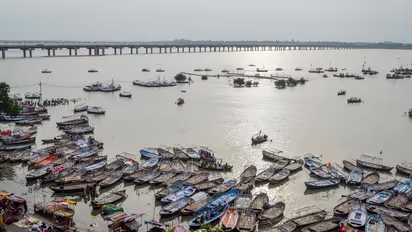Ganga river water as cure for Covid? Modi govt clears the air

Synopsis
The NMCG did send two proposals named 'Ganga Sediments could immunize against COVID-19' and 'Treatment of COVID-19 by Ganga Jal' on April 28, 2020, to the Indian Council of Medical Research for examination at their end.
The Narendra Modi government on Thursday denied receiving any request to conduct research on the use of Ganga river water as a cure for the Covid-19 virus from the National Mission for Clean Ganga (NMCG).
However, the NMCG did send two proposals named 'Ganga Sediments could immunize against COVID-19' and 'Treatment of COVID-19 by Ganga Jal' on April 28, 2020, to the Indian Council of Medical Research for examination at their end.
Also Read: 'Excuses to stop...': Rahul Gandhi reacts to Mandaviya's letter over COVID norms
The NMCG is an arm of the Jal Shakti Ministry that deals with the river's rejuvenation. The body had reportedly received a number of proposals from non-profit organisations and individuals working to clean the river to undertake clinical studies for the treatment of coronavirus with water from the Ganga.
But, the ICMR has rejected the proposals stating that credible scientific data was needed.
Tests were carried out during the Covid-19 period, and studies conducted by the Central Pollution Control Board (CPCB), State Pollution Control Boards (SPCBs) and other agencies to assess the Covid-induced lockdown's impact on the quality of water in river Ganga and its tributaries.
Minister of State for Jal Shakti Prahlad Singh Patel informed Parliament on Thursday that the Central Pollution Control Board (CPCB) found no definite trend existing in different water quality parameters observed for various stretches of river Ganga and its tributaries. However, as per CPCB and SPCB reports, varying degrees of improvement in a few water quality parameters were observed.
This improvement, according to the minister, could be attributed to various factors like the increased availability of freshwater due to rainfall in the river catchment, no industrial effluent discharge and reduced human activity during the lockdown period like restriction on bathing, ritual disposal, solid waste, mass washing of clothes, tourism, etc.
It was ensured during the lockdown that all sewage treatment plants (STPs) continued to function without interruptions, the minister said, adding that guidelines were laid out to follow all safety precautions while continuing the operation of sewage treatment plants. The various interventions for the abatement of pollution of rivers have been continued.
Also Read: 'Over 100 YouTube channels blocked for spreading misleading information': Anurag Thakur
Stay updated with the Breaking News Today and Latest News from across India and around the world. Get real-time updates, in-depth analysis, and comprehensive coverage of India News, World News, Indian Defence News, Kerala News, and Karnataka News. From politics to current affairs, follow every major story as it unfolds. Get real-time updates from IMD on major cities weather forecasts, including Rain alerts, Cyclone warnings, and temperature trends. Download the Asianet News Official App from the Android Play Store and iPhone App Store for accurate and timely news updates anytime, anywhere.